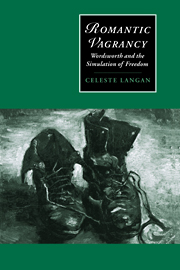Book contents
- Frontmatter
- Contents
- Acknowledgments
- List of abbreviations
- A methodological preamble
- Introduction
- 1 Rousseau plays the beggar: the last words of citizen subject
- 2 Money walks: Wordsworth and the right to wander
- 3 Walking and talking at the same time: the “two histories” of The Prelude
- 4 The walking cure
- Notes
- Works cited
- Index
- CAMBRIDGE STUDIES IN ROMANTICISM
A methodological preamble
Published online by Cambridge University Press: 19 October 2009
- Frontmatter
- Contents
- Acknowledgments
- List of abbreviations
- A methodological preamble
- Introduction
- 1 Rousseau plays the beggar: the last words of citizen subject
- 2 Money walks: Wordsworth and the right to wander
- 3 Walking and talking at the same time: the “two histories” of The Prelude
- 4 The walking cure
- Notes
- Works cited
- Index
- CAMBRIDGE STUDIES IN ROMANTICISM
Summary
The development of each human fate can be represented as an uninterrupted alternation between bondage and release, obligation and freedom… What we regard as freedom is often in fact only a change of obligations; as a new obligation replaces one that we have borne hitherto, we sense above all that the old burden has been removed. Because we are free from it, we seem at first to be completely free – until the new duty, which initially we bear, as it were, with hitherto untaxed and therefore particularly strong sets of muscles, makes its weight felt as these muscles, too, gradually tire. The process of liberation starts again with this new duty, just as it had ended at this very point.
Georg Simmel, The Philosophy of Money (1907)Walking, then, is a perpetual falling with a perpetual self-recovery.
Oliver Wendell Holmes, “The Physiology of Walking” (1883)I begin by adjoining two passages – one about freedom, the other about walking. By what odd logic does their mere proximity suggest an equation or an identity between the central terms? Perhaps the transformation of contiguity into sequence that reading produces offers one clue; reading the passages in succession, we are inclined to complete the implicit syllogism, and conclude that “freedom is walking.” We are accustomed to expect from narrative a progressive expansion of knowledge, and Holmes's description of walking, since it follows Simmel's description of the freedom made possible by money, may seem to consolidate the abstract language of the first. But this narrative logic cannot explain the full force of the equation between descriptions of walking and freedom that occurs as a consequence of their symmetrical arrangement.
- Type
- Chapter
- Information
- Romantic VagrancyWordsworth and the Simulation of Freedom, pp. 1 - 12Publisher: Cambridge University PressPrint publication year: 1995



